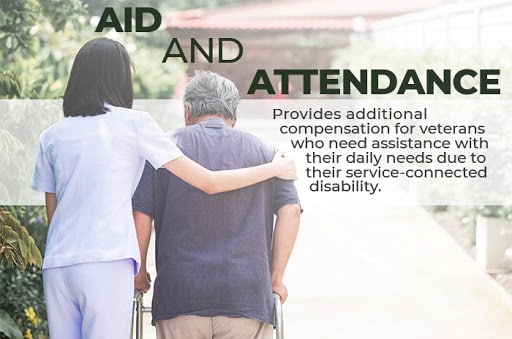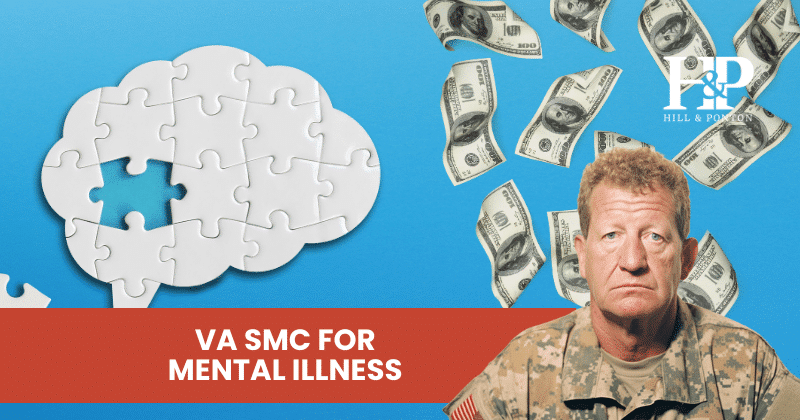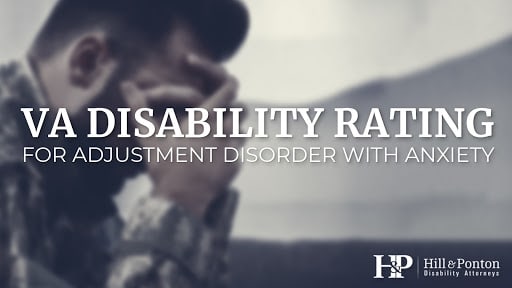When most people hear the phrase “Aid and Attendance,” they often think of veterans dealing with visible, physical injuries. Images of mobility devices, missing limbs, or paralysis tend to come to mind first.
But mental health challenges can quietly create just as much dependency, sometimes more. Veterans living with severe psychological conditions may struggle to complete routine tasks without constant oversight. These challenges aren’t always visible, but they can deeply affect daily life.
For instance, someone dealing with hallucinations, disorganized thinking, memory loss, or emotional dysregulation might not be able to cook safely, remember to take medications, or recognize when they’re in danger. Others may become isolated, forget to eat, or experience episodes that put them at risk of injury or exploitation.
Special Monthly Compensation (SMC) exists to account for these more intensive care needs. When a service-connected mental illness interferes with a veteran’s ability to safely manage day-to-day life without support, the VA may assign a higher compensation rate through SMC.
This isn’t about the diagnosis itself, it’s about what the symptoms prevent the veteran from doing independently. If you’re navigating the impact of a mental health condition and need help with daily living, even if your condition doesn’t limit your mobility, you may be eligible for higher compensation under SMC.
SMC–L for Mental Illnesses Requiring Aid & Assistance
SMC–L is one of the foundational levels of Special Monthly Compensation, and it can apply to veterans whose mental health conditions prevent them from safely performing essential personal tasks without help. Mental illnesses that severely impair judgment, memory, awareness, or emotional regulation may interfere with their ability to care for themselves.
To qualify for SMC–L, the veteran’s mental health condition must require regular, personal assistance from another person. This assistance must go beyond casual help, it needs to be a consistent and necessary part of their routine to keep them safe and functioning. Examples of qualifying scenarios include:
- A veteran with schizophrenia who becomes disoriented and forgets to eat unless reminded
- Someone with major depressive disorder who is unable to maintain basic hygiene due to severe apathy and withdrawal
- A person with PTSD who cannot be left alone without experiencing flashbacks that lead to dangerous behavior
- A veteran with cognitive decline from TBI who takes the wrong medication doses without supervision
Key areas where help is often required include:
- Dressing appropriately for the weather or situation
- Maintaining personal hygiene such as showering or oral care
- Feeding oneself safely (not just cooking, but the act of eating regularly and without risk of choking or neglect)
- Taking prescribed medications accurately and on time
- Staying protected from common hazards (like forgetting to turn off the stove or wandering outside at night)
These are not one-time needs. The VA expects that this assistance must be needed on a regular and ongoing basis, not just occasionally. You can learn more about SMC–L here.

SMC–R for Mental Illnesses Requiring Regular Supervision
SMC–R is one of the most advanced levels of Special Monthly Compensation, available to veterans whose care needs go beyond basic daily assistance. However, it is rare and difficult for a mental illness to qualify (unless related to TBI), and requires having other service-connected disabilities in addition to the psychiatric issues. Find out more about SMC-R1 for PTSD.
SMC–S for Mental Illnesses Keeping the Veteran Housebound
SMC–S is designed for veterans whose service-connected conditions are so severe that they are essentially confined to their homes. While many people associate housebound status with physical disabilities, mental health conditions can also qualify, especially when symptoms make it unsafe or overwhelming for the veteran to leave home. There are two main ways to qualify.
1. Statutory Housebound (100 + 60 Rule)
To meet this requirement, the veteran must have one service-connected condition rated at 100% (this can be a mental illness) and another separate service-connected condition rated at 60% or higher.
The VA does not require these conditions to be related. For example, a veteran with PTSD rated at 100% and degenerative joint disease rated at 60% could qualify.
If the veteran receives TDIU (Total Disability based on Individual Unemployability) from a single mental health condition, that also counts as the 100% rating. This type of SMC is granted regardless of whether the veteran actually stays home, as long as the rating requirements are met.
2. Factual Housebound
This applies when a veteran is genuinely limited to their home due to the effects of a mental illness, even if they don’t meet the percentage ratings described above. For example:
- A veteran with schizophrenia may experience paranoia that prevents them from going outside safely.
- A person with bipolar disorder may have manic or depressive episodes so extreme that they cannot function in public settings.
- Someone with severe anxiety or panic disorder may become isolated, avoiding any place outside their immediate home environment.
In these situations, the VA can award SMC based on actual lifestyle restrictions, even if the technical rating thresholds aren’t met. This determination relies on medical evidence and personal statements showing how the mental health condition causes the veteran to remain substantially confined to their residence.
To see a full list of rules and pay rates, visit SMC–S Housebound Benefits.
Mental Illnesses That Can Make Veterans Eligible for SMC-S
Certain service-connected mental conditions are more likely to meet the criteria due to the serious symptoms they cause and how they affect daily functioning. Here are several mental illnesses that frequently qualify:
- Post-Traumatic Stress Disorder (PTSD)
- Schizophrenia
- Bipolar Disorder
- Major Depressive Disorder
- Traumatic Brain Injury (TBI) with Cognitive Deficits
This list is not exhaustive. What matters most is how the condition affects the veteran’s ability to live independently, not just the diagnosis alone. Medical evidence and daily impact are key.
How Much Can You Receive?
When a veteran qualifies for Special Monthly Compensation, the standard monthly VA disability payment is replaced with a higher SMC rate. These higher payments are meant to reflect the veteran’s need for additional care, support, or supervision.
Unlike traditional VA disability compensation for mental disorders, SMC is not based on a percentage scale. Instead, the VA uses fixed monthly amounts, which are tied to the severity of the veteran’s mental health issues and their specific care needs. For example:
- Veterans approved for SMC–L may receive several hundred dollars more each month than the basic 100% disability rate.
- Veterans who qualify for SMC–R2 (which requires daily skilled medical care) can receive the highest compensation available, potentially more than double the standard 100% disability rate.
Exact amounts can differ depending on marital status, number of dependents and whether the spouse also requires Aid and Attendance.
Rates are updated annually by the VA, meaning they may go up slightly each year based on cost-of-living adjustments.
How Does the VA Decide That a Mental Disorder Qualifies for SMC?
The VA doesn’t award Special Monthly Compensation just because a veteran has a diagnosed mental health condition. Instead, the key question is how that condition impacts your ability to function day-to-day.
The VA evaluates functional impairment—in other words, how symptoms affect your ability to live safely and independently, not just the condition itself. To determine eligibility, the VA will ask questions that focus on daily activities and risks to your safety, such as:
- Does the Veteran’s mental health impairment cause danger to him/herself? In other words, does the veteran experience suicidal ideation? If a caregiver such as a spouse was not around, would the veteran contemplate harming himself? Does the veteran experience lack of concentration that causes a loss of focus while driving?
- Does the Veteran’s mental health impairment cause danger to others? Does the veteran experience homicidal thinking? Does the veteran have explosive anger that may lead to physical altercations? Has the veteran ever gotten into an argument that involved the police? How bad is the veteran’s road rage?
- Does the Veteran need the aid and attendance of another person in order to protect himself or herself from hazards or dangers incident to daily life because of a diagnosed mental health disability? Does the veteran’s mental health condition affect long or short term memory? If the veteran were cooking, are they likely to leave the stove on? Could the veteran’s lack of focus affect the ability to concentrate on cutting up vegetables for dinner and lead to an injury? Does the veteran go into “fight or flight” that could cause a dangerous reaction at the sound of a fire alarm or fireworks?
- Does the Veteran have severe impairment in judgment even for routine and familiar decisions, usually unable to identify, understand, and weigh the alternatives, understand the consequences of choices, and make a reasonable decision? Does the veteran dress improperly for the weather? Does the veteran neglect his/her hygiene? Does he/she need to be reminded to eat? Does the veteran inappropriately laugh at sad situations? Does the veteran lack the ability to identify dangerous situations such as running with a knife in the kitchen?
- Is any other incapacity, physical or mental, which requires care or assistance on a regular basis to protect the claimant from hazards or danger incident to his daily environment due to his/her diagnosed mental health impairment? Does the veteran get lost even in familiar surroundings? Is the veteran impulsive? Does the veteran properly weigh the pros and cons to dangerous or risky situations?
There are also other Aid and Attendance criteria that are included on the VA Form 21-2680; Examination for Housebound Status or Permanent Need for Aid and Attendance (also referred to as, A&A DBQ). Some examples include:
- Is the claimant able to feed him/herself?
- Is the claimant able to prepare their own meals?
- Does the claimant need assistance in bathing and tending to hygiene?
- Does the claimant require medication management?
- Can the veteran mentally manage his own financial affairs?
If the VA believes your mental condition makes it difficult to manage your disability benefits, they may propose to rate you as incompetent. This decision can redirect your payments to a fiduciary (a person or company that manages your funds) and potentially limit your control over future benefits or how SMC is used.
If this happens, it can negatively affect your claim, even if your condition clearly qualifies for SMC. Learn more about what happens during the VA fiduciary process.
How to Get VA SMC for Mental Illness
If your mental health condition qualifies, the VA should assign SMC when processing your claim. But in reality, errors and omissions are common when symptoms aren’t clearly documented or when decision-makers don’t fully understand how psychiatric conditions affect daily life.
That’s why it’s important to be proactive and include strong supporting evidence when you apply or appeal. To increase your chances of approval, make sure to include:
- VA Form 21-2680 – This is the Examination for Housebound Status or Permanent Need for Aid and Attendance. It gives the VA a detailed view of your daily limitations. Be sure to have it filled out by a healthcare provider who knows your condition well.
- Medical statements from treating providers – These can come from your psychiatrist, psychologist, primary care doctor, or mental health counselor. Their statements should clearly explain how your symptoms limit your ability to function independently.
- Caregiver statements – If someone helps you on a daily basis, whether it’s a spouse, friend, or in-home health aide, ask them to write a statement describing the care they provide and why it’s necessary.
- Personal statements – You or a family member can submit a lay statement explaining how your mental health condition affects your safety, hygiene, medication use, and decision-making.
Common Mistakes to Avoid:
- Don’t assume the VA will “connect the dots” if your paperwork doesn’t spell it out clearly.
- Don’t leave the A&A DBQ incomplete or filled with vague answers.
- Don’t wait to include SMC-related evidence—submit it with your claim or appeal, not after.
A VA disability lawyer can help you obtain SMC if the VA has denied you – or get to a higher level for increased compensation.
SMC benefits can significantly increase your monthly compensation. But if your mental health limits your ability to apply or communicate with the VA, make sure someone you trust can help you keep track of deadlines and correspondence.
Even if you already receive VA disability compensation, you could be missing out on SMC benefits you’re entitled to. Request a free case evaluation to find out how to strengthen your claim or appeal.




